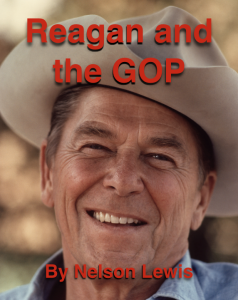For the GOP, nearly every single presidential hopeful seems to bring up Reagan, claiming themselves to be a successor to the Republican titan under whose banner the United States emerged triumphant in the Cold War and ushered in a golden age. It’s been over 25 years since Reagan left office, yet the Republican Party has been looking for somebody to take up his lofty mantle. I recently came across an article about Reagan’s relevance in the current election; even though it was written a year ago, a lot of what it said is still relevant.
Conservatives view Reagan’s presidency as a golden age, when the movie-star-turned-political-superstar won two terms in major landslides and brought down the threat of Communism without any sort of Joe McCarthy-style witch hunt. They feel that the Clinton and Obama presidencies have undone Reagan’s great work, and that the two Bush presidencies weren’t enough to fix the situation. In the aftermath of two failed presidential elections in a row, the Republican Party looks back to a day when Reagan made the GOP a unifying force.
While the GOP and the Democratic Party are having trouble working together these days, Reagan was able to cut deals with his Democratic opponents, worked on tax increases no modern Republican would ever go for and even extended amnesty to illegal immigrants. He also recognized that sometimes it helps to talk to America’s enemies; he worked with Gorbachev to end the Cold War and sold arms to Tehran to win the release of hostages, things the modern GOP would impeach Obama for even suggesting.
Yet nearly every current GOP nominee, including many who have stepped down since the article was written, have invoked the Reagan image; Jeb Bush was seen on the campaign trail wearing a 1984 Reagan-Bush t-shirt. Marco Rubio has hailed the former President as a childhood hero. In one speech, Chris Christie named Reagan six times in one minute. Ted Cruz has listed Reagan as a major influence. And although Reagan’s son Michael has strongly rejected the comparison, even Donald Trump has called himself an heir to Reagan.
Some, including 1996 GOP nominee Bob Dole, have even suggested that if Reagan were to run as a Republican candidate now, he couldn’t earn the nomination because he was too much of a moderate. Yet this ignores Reagan’s political skills and his role in revolutionizing the GOP. In 1964, he made a televised speech for nominee Barry Goldwater that made him a national figure and set the standard for modern conservative values: small government, personal freedom and hawkish foreign policy. Twelve years later, he challenged sitting Republican President Gerald Ford. Even if granting amnesty to illegal immigrants or cutting deals with Iran are things that most modern Republicans would never tolerate, many conservatives, including American Conservative Union chair Matt Schlapp, view Reagan as an example: a philosophically-grounded and plain-spoken politician who understands what can and can’t get done. And that, more than anything else, is why he’s become such an enduring political icon.
